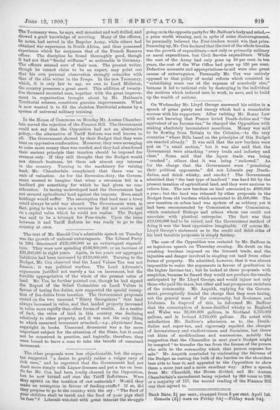The case of the Opposition was restated by Mr. Balfour
in an ingenious speech on Thursday evening. He dwelt on the crushing burdens imposed on the licensed trade, and the injustiee and danger involved in singling out land from other forms of property. He admitted, however, that it was almost impossible to resist the arguments in favour of graduation in the higher Income-tax ; but he looked at thee° proposals with suspicion, because he feared they would not produce the results anticipated by Mr. Lloyd George, and would injure not only those who paid the taxes, but other and less prosperous members of the community. Mr. Asquith, replying for the Govern- ment, peremptorily denied the charge that they were taxing, not the general mass of the community, but Scotsmen and Irishmen. In disproof of this, he informed Mr. Balfour that the consumption of home-distilled whisky in England, and Wales was 22,000,000 gallons, in Scotland 6,750,000 gallons, and in Ireland 3,750,000 gallons. He noted with satisfaction Mr. Balfour's admission as to the Death- duties and super-tax, and vigorously repelled the charges of inconsistency and vindictiveness and Socialism, but threw out hints of modifications and ooneessione, notably the suggestion that the Chancellor in next year's Budget might be tempted "to transfer the tax from the license of the person who sells to the commodity which that person exposes for sale." Mr. Asquith concluded by vindicating the fairness of the Budget as casting the bulk of the burden on the Bhoulders best able to bear it, and appealed to the Opposition to show them a more just and a more excellent way. After a speech from Mr. Churchill, the Howie divided, and Mr. Austen Chamberlain's amendment being rejected by 3'66 votes to 209, or a majority of 157, the second reading of the Finance Bill was then agreed to.










































 Previous page
Previous page